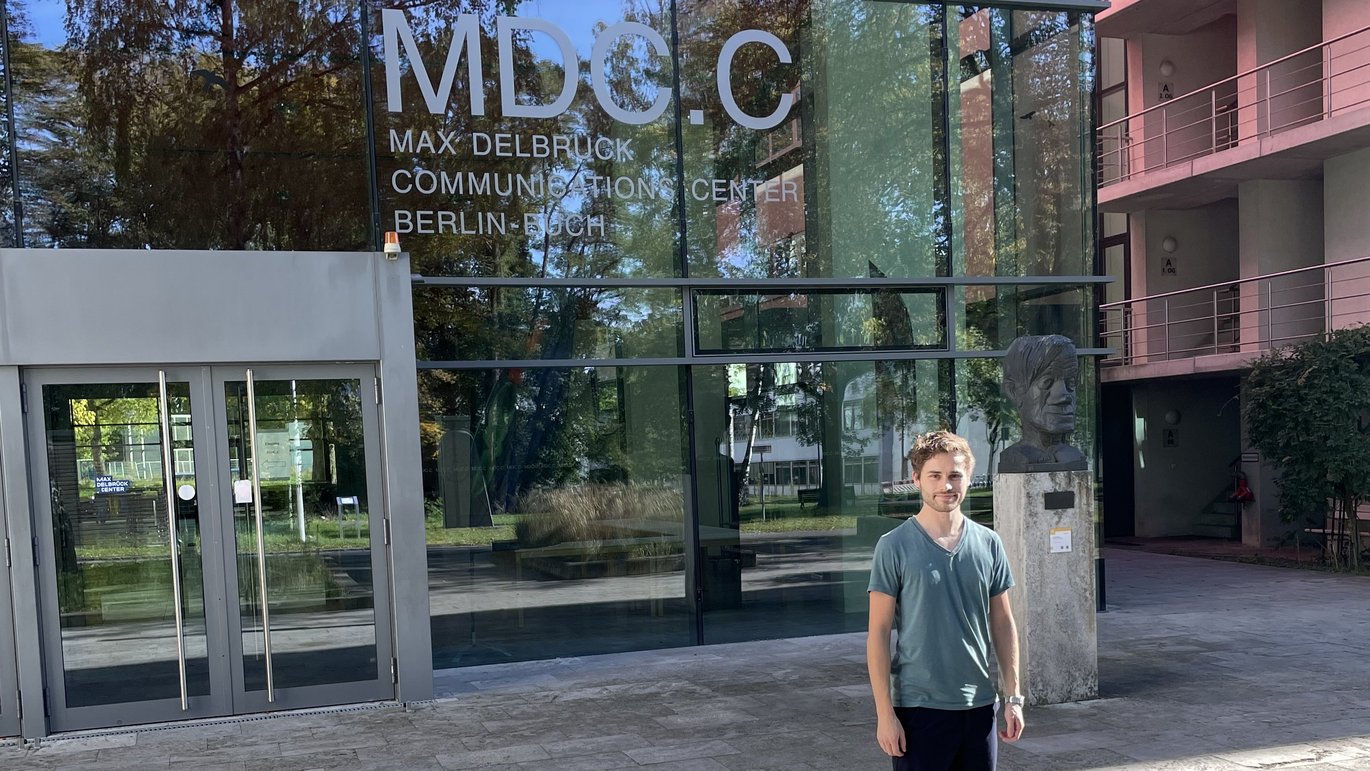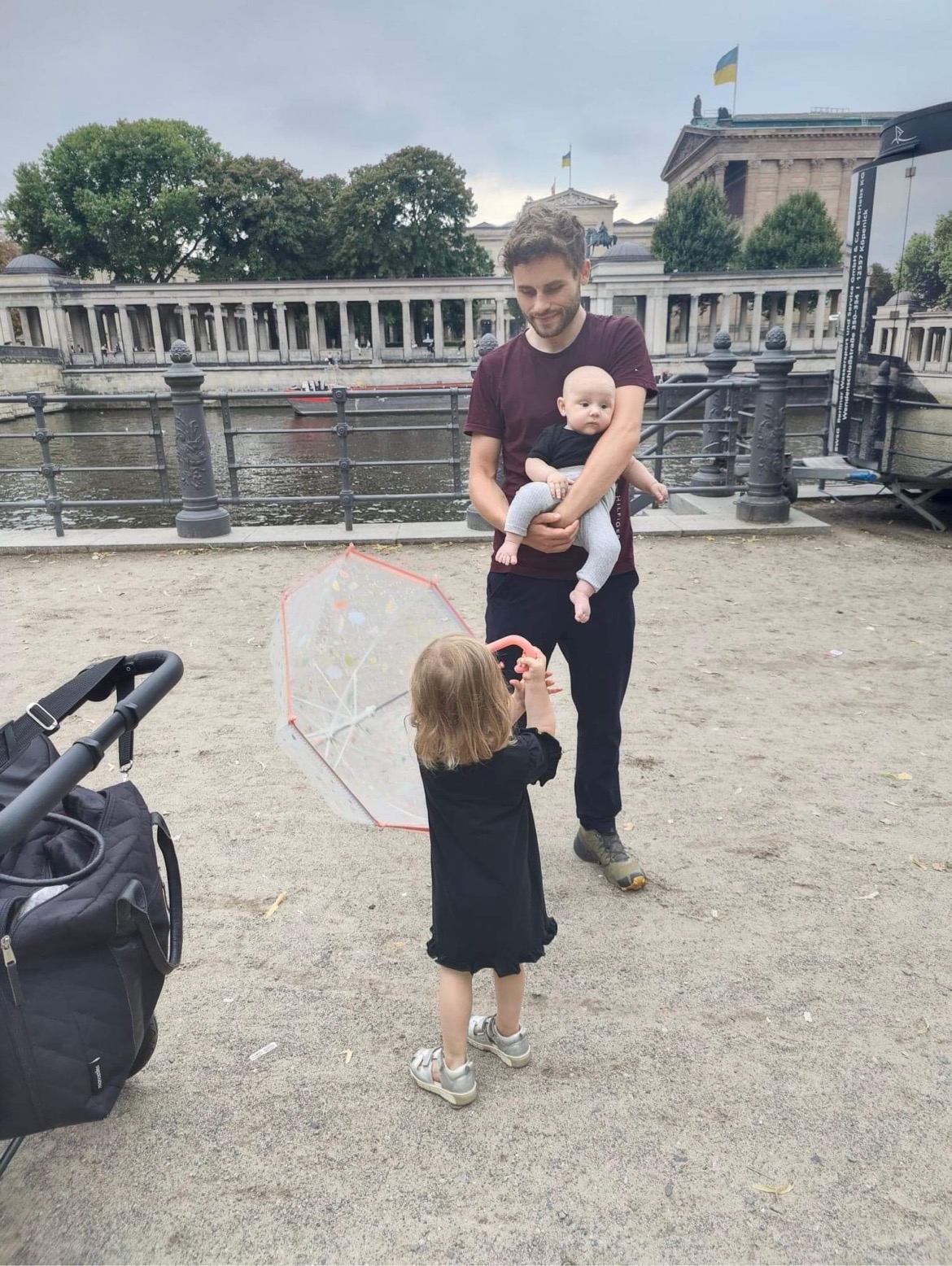Researcher portrait: Kristian cultivates mini-brains in Berlin
Armed with a postdoc grant, Kristian Juul-Madsen travelled to Berlin to study the brain’s immune cells and Alzheimer’s disease. But he does not believe that spending a year abroad should be decisive for a career as a researcher.


Kristian Juul-Madsen spends more time on the E45 motorway than most people.
Every other week, he drives from Berlin to Randers – either to pick up his girlfriend and their two children, or to take them home again.
The 30-year-old postdoc from the Department of Biomedicine is working at the Max Delbrück Centre, a research institute in Berlin, where he is investigating the significance of microglial cells in the development of Alzheimer’s disease.
The stay abroad has been carefully planned so that it fits into the family’s life in the best possible way.
“It’s absolutely marvellous that we can do it this way. I’ve found a place that fits perfectly, both geographically and academically,” he says.
But he is well aware that not everyone has the opportunity to take a year abroad, at a time in your life where there are often also births, day-care centres, spouses and finances to take into account. He has an opinion about this which he would like to be mentioned in the interview, he says in a Zoom call from the laboratory on the northeast outskirts of Berlin.
Organoids are the future
It was a great day for Kristian Juul-Madsen when he was awarded postdoc grants from Independent Research Fund Denmark and the Lundbeck Foundation, respectively, which made it possible for him to work abroad for a year.
The grants are probably career-defining: Kristian Juul-Madsen knows that a year at a foreign laboratory weighs heavily on the scales if you dream of one of the coveted tenure-track positions that can lead to a permanent position as a researcher at Aarhus University.
In Berlin, he is working with microglial cells, which act like scavengers among the brain cells, as they are good at clearing up when proteins or cells become damaged or broken. He is learning to make microglial cells from stem cells, in order to modify them and place them in a model of the human brain. In this way, he can study how the development of Alzheimer’s disease is affected by the presence of, or lack of, certain receptors.
The researchers at the Max Delbrück Centre have great expertise in creating cerebral organoids – an artificially grown mini-model of a human brain – and the stay has given Kristian Juul-Madsen the opportunity to specialise in these techniques and take this new expertise back to Aarhus University, where he will be working for the final two years of the project.
“There are really good stem cell facilities here in Berlin. I’m gaining experience in producing brain models that we can experiment with – it’s a small field that has a huge interest. It’s not certain that organoids will take over the place that mice occupy today, but a lot of research will be taking place with human stem cells in the future,” says Kristian, who has a background in immunology.
The techniques take time to learn. They are not equipment-dependent, but more practical in nature: What oxygen level do the cells need, how do they behave, and how do we characterise them, he explains from the office he shares with another Dane, an American and, until recently, a Ukrainian.
The stem cells must have sugars and growth factors every day, their energy metabolism needs to be maintained, and they must be split and seeded to become the right immune cells. In those weeks when his family is not visiting him in Berlin, he often works both evenings and weekends.
You can create networks in many ways
Kristian Juul-Madsen’s daughter was two years old, and his girlfriend was pregnant again, when he travelled to Berlin this year on 1 March to join Professor Thomas Willnow’s laboratory in the German city.
He was back home when his son was born in May, and after the birth he returned to Berlin. Since August, the family has had an arrangement where Kristian Juul-Madsen’s girlfriend and children stay in the apartment in Berlin with him for two weeks, then go home to Denmark for the following two weeks. He drives them back and forth.
Kristian Juul-Madsen has no complaints about his situation. On the contrary, he has, in his own words, been “incredibly lucky” to find a postdoc position abroad that suits him both academically and privately.
But he also sees talented young colleagues with research ambitions who cannot take a year abroad, and so must abandon the dream of a career at the university. And that’s a shame, he thinks.
“I understand that there is a requirement for a period of study abroad of at least a year after completing your PhD if you want to be considered for a tenure track position, for which there is a lot of competition. When I talk to senior researchers about career guidance, they say that if you haven’t had a long stay abroad, you might as well not bother applying.”
Kristian Juul-Madsen can see that his stay in Berlin creates value both academically and in terms of networking, but he believes that it would be possible to gain the same benefit through visits, online channels, or shorter stays.
He experienced this, for example, during his PhD studies when he spent four months in the USA, where he worked at the National Institutes of Health.
“Four months was plenty of time to establish networks. I’m still in close contact with the group that I was part of in the US. It’s silly that a long period of study abroad weighs so heavily on the scales, because some people just can’t get that to work for their families,” he says.
“I think the university loses out on a lot of talent that way, and we cut off some of the very best researchers. I’m very grateful that I could get my family situation to work together with an academically relevant project abroad, but far from everyone can make it work. You should not have to go to the back of the queue just because you haven’t fulfilled a requirement that can be very difficult to meet.”
When he talks with his family over FaceTime, he knows that it is not his girlfriend’s dream to have sole responsibility for the nappies and lunch packs back home, and travel back and forth to Berlin with a baby.
“I’m fully aware of how hard it is for my partner. She’s doing this for my sake, because I hope to gain a permanent position at a Danish university.”
Weighs heavily in the assessment
The faculties have different assessment criteria for the transition to a tenured position as associate professor or professor, says Hans Erik Bøtker, Vice-dean of Research at Health.
In Health’s guidelines for appointment to an associate professorship, a study period abroad is not mandatory. The guidelines do however state that “international cooperative relations with researchers/research institutions is expected, together with experience of managing research projects and leading/inspiring other researchers”, and that “emphasis is placed on residence or employment at one or more internationally recognised research institutions”.
So there’s no doubt that a longer period of study abroad is an important item on your CV, says Hans Erik Bøtker.
“Fortunately, research is not limited by national borders, and insight into the international nature of research is something you gain by, for example, studying abroad. Of course, it can be a major challenge for both the researcher and his or her family to travel abroad for a long period of time, but there is development potential in this, both academically and personally, that is difficult to achieve to the same extent in Denmark,” he says.
However, whether or not it is exactly 12 months abroad is not the decisive factor, says the Vice-dean:
“The most important thing is that the researcher acquires new skills, international networks and experience in working across disciplines and cultures. When you are in the competitive situation of applying for an appointment, it is an advantage if your stay abroad has been of a duration that will actually benefit you – e.g. in the form of a joint publication or teaching skills.”
About the research:
- Kristian Juul-Madsen is employed for one year from 1 March 2022 at the Max Delbrück Centre for Molecular Medicine in Berlin.
- In 2022, he received a postdoc grant from Independent Research Fund Denmark and a grant from the Lundbeck Foundation for a project in which he and Professor Thomas Willnow (Department of Biomedicine) study the significance of microglia cells in the development of Alzheimer’s (‘iPSC-based models of microglia function in Alzheimer’s disease’).
Contact:
Postdoc Kristian Juul-Madsen
Aarhus University, Department of Biomedicine and the Max Delbrück Centre in Berlin.
Tel.: +45 6128 5520.
E-mail: juul-madsen@biomed.au.dk
Vice-dean for Research Hans Erik Bøtker
Aarhus University, Health
Tel.: +45 4029 3389
E-mail: boetker@au.dk